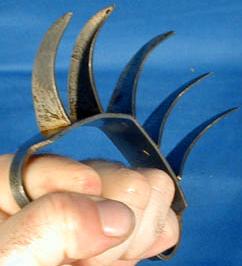Difference between revisions of "Steel bagh-nakh"
From Cantr II Wiki
(→Images) |
(→Description and uses) |
||
| Line 28: | Line 28: | ||
==Description and uses== | ==Description and uses== | ||
The bagh-nakh is a fist weapon, meaning that it fits in the fist a bit like knuckle-dusters. The name means Tiger Claw because it not only looks like the claws of a wild beast but the wounds it creates look like those an animal would cause. It isn't particularly powerful because it has a much shorter reach than most bladed weapons. However it is a good weapon for assassins, thieves and muggers because it can be concealed in the hand until the attacker is in close quarters with the unsuspecting victim. | The bagh-nakh is a fist weapon, meaning that it fits in the fist a bit like knuckle-dusters. The name means Tiger Claw because it not only looks like the claws of a wild beast but the wounds it creates look like those an animal would cause. It isn't particularly powerful because it has a much shorter reach than most bladed weapons. However it is a good weapon for assassins, thieves and muggers because it can be concealed in the hand until the attacker is in close quarters with the unsuspecting victim. | ||
| + | |||
| + | A character who is carrying bagh-nakh can pretend to be unarmed and does not need to justify carrying a weapon. | ||
==Real-life context== | ==Real-life context== | ||
Revision as of 04:42, 6 June 2007
| ||||||||||||||||||||||
| ||||||||||||||||||||||
Description and uses
The bagh-nakh is a fist weapon, meaning that it fits in the fist a bit like knuckle-dusters. The name means Tiger Claw because it not only looks like the claws of a wild beast but the wounds it creates look like those an animal would cause. It isn't particularly powerful because it has a much shorter reach than most bladed weapons. However it is a good weapon for assassins, thieves and muggers because it can be concealed in the hand until the attacker is in close quarters with the unsuspecting victim.
A character who is carrying bagh-nakh can pretend to be unarmed and does not need to justify carrying a weapon.
Real-life context
The weapon is believed to have first appeared in India, possibly used by guerilla fighters in the 17th Century.
